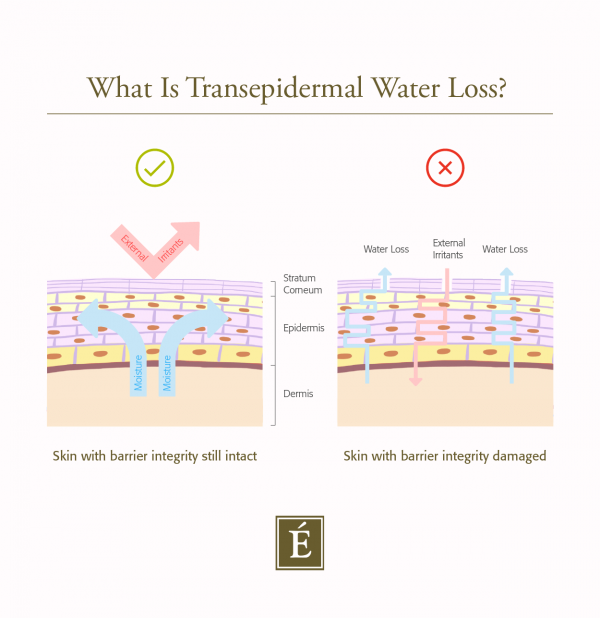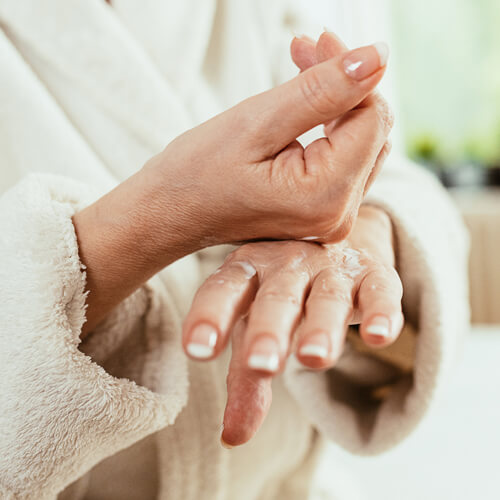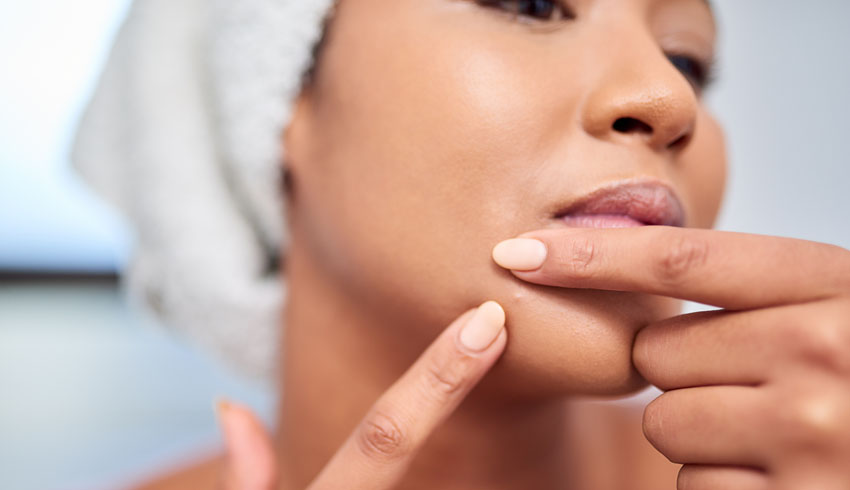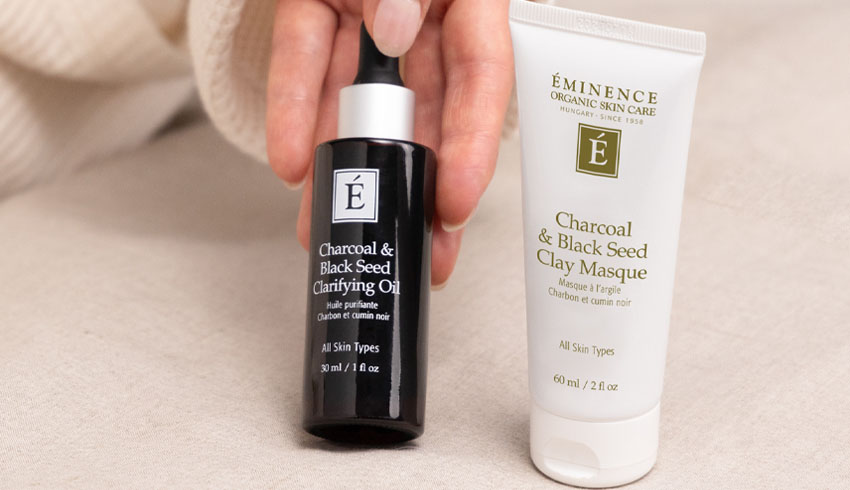
If you’re suffering from dehydrated or dry skin, one of the causes may be transepidermal water loss (TEWL). Translation? You're losing water and moisture from your skin. TEWL can lead to a variety of dry skin conditions — including severe dehydration — but there are ways that you can keep your skin hydrated or prevent dryness from occurring in the first place.
Key Takeaways
- The Science of TEWL: Transepidermal water loss occurs when water passes from the dermis through the epidermis and evaporates, usually because the outermost skin barrier (the stratum corneum) is compromised.
- Identifying a Damaged Barrier: You can tell your skin is suffering from TEWL if you experience a persistent "tight" feeling, visible flaking, itchiness, or localized irritation.
- The "Moisture Trap" Strategy: Effective recovery requires a combination of humectants to draw water in and occlusives (like beeswax or rich night creams) to create a physical seal that prevents evaporation.
- Environmental & Habitual Triggers: Beyond cold weather and dry indoor air, TEWL is often worsened by over-care, such as using harsh foaming cleansers, over-exfoliating or bathing in water that is too hot.
What Is Transepidermal Water Loss?
In order to understand TEWL, let's revisit the layers of our skin. Our skin is made up of three primary layers, the outermost being the epidermis (aka what you look at in the mirror). The dermis is the middle layer and the hypodermis is the innermost layer. TEWL occurs when water passes from the dermis through the epidermis and evaporates through the skin barrier.
As dermatologist Anna Guanche tells Allure: "The skin barrier consists of the epidermis and, most specifically, the hard, outermost layer of the stratum corneum. The epidermis is what we typically think of as the outer layer of the skin, but it's made up of five layers. The outermost layer of the epidermis is the stratum corneum.”
When the stratum corneum is compromised, moisture evaporates through the ineffective skin barrier, and you can expect to see very dry, dull or dehydrated skin. Your skin is typically clever enough to regulate water loss and retain hydration on its own, but sometimes certain factors damage your skin barrier’s function, exacerbating dryness. If you’re wondering whether your skin barrier has been compromised and is losing water, it helps to know what to look out for. Here are four signs that you're suffering from TEWL:
- Irritation: Water loss is caused by a damaged skin barrier, which often feels irritated.
- Flaking: The topmost surface of the skin dries out, dies and peels away in flakes.
- Itchiness: The skin cracks from water loss, causing an itchy feeling
- Tightness: Dehydrated skin cells condense and pull tighter across the surface, resulting in a tight feeling.

What Factors Trigger Transepidermal Water Loss?
TEWL can be triggered by:
- Skin conditions like eczema, dermatitis or rosacea
- Dry weather or excessive time with dry air indoors (i.e. from air conditioners and central heating)
- Over-washing, over-exfoliating and scrubbing with harsh soaps
- Allergies, diabetes or kidney disease
- Aging skin as your sebum production decreases
- Sunburn or wounds
- Chlorine
How To Stop Transepidermal Water Loss
The most important part of preventing TEWL is ensuring you have a healthy skin barrier. You may be thinking, “What is a skin barrier, and how are we supposed to protect it?”
A healthy, functioning skin barrier blocks environmental irritants out, while keeping all the good stuff, like natural oils and moisture, in. A compromised skin barrier does a poor job of maintaining your skin’s health due to ineffective water retention, which can lead to skin conditions like dermatitis or dryness. TEWL can lead to a variety of skin conditions — including severe dehydration.
To keep your skin's ecosystem healthy and prevent TEWL, take a look at the following lifestyle and skin care tips.
1. Use Moisturizing Products
Moisturizing is an important strategy for maintaining skin health as well as treating an impaired skin barrier function. Our Eminence Organics Product Development team say: “Preventing TEWL will keep your skin's barrier healthy and hydrated. Richer creams will lock in moisture, preventing water loss while you sleep.”

For example, night creams are an essential part of the skin care routine. During the night, the skin is in recovery mode, which means it's the ideal time to use ultra-rich creams with a higher concentration of active ingredients to boost hydration, restore the skin and improve the skin’s appearance. This is an especially important step for mature skin. Our Marine Peptide Collection is designed to reduce transepidermal water loss with rich age-defying formulas that lock in moisture. Some products within this collection contain exopolysaccharide, an ingredient that helps limit TEWL, improving skin hydration.
You can also use the ultra-rich Monoi Age Corrective Night Cream For Face & Neck which is very effective on protecting your face and neck skin. This cream helps you reduce the signs of aging overnight as you sleep. It contains tropical monoi to firm and hydrate the look of the skin. Watch our Lead Skin Care Trainer, Natalie Pergar, as she walks us through a night skin care routine to keep your skin hydrated and prevent dryness from occurring in the first place.
TEWL can be further reduced by using skin care products that contain humectants, occlusives and emollients. These are important ingredients found in moisturizers. Humectants (like glycerin and hyaluronic acid) draw water from the environment into the skin. But this isn’t enough — you need something to stop this moisture from evaporating. That’s why you need occlusives like beeswax which act as a lipid barrier for water retention. Emollients minimize TEWL too and also are used to make moisturizers feel smoother.
2. Use A Humidifier for a Compromised Skin Barrier
If you live in a dry climate, or are susceptible to dry winter weather, try using a humidifier in your home to see if it gives your skin time to heal. Studies have shown that humidifiers generating “nano-sized water particles” seem to “positively affect skin hydration and skin barrier function”.
3. Skin Hydration Techniques for Bathing
If you’re already suffering from dry, dehydrated skin, ScienceDirect recommends applying a wet face cloth or towel to the area, while your hands or feet can be treated by soaking in a basin. Bathe for approximately 10 minutes in warm (not hot) water, and then follow up with an occlusive moisturizer to lock in the moisture. When hydrating the face or neck, ScienceDirect recommends applying a wet face cloth or towel to the area, while your hands or feet (i.e. if you’re suffering from dermatitis) can be treated by soaking the limb in a basin.
4. Avoid Harsh Cleansers & Over-Exfoliating
Over-washing, over-exfoliating, chemical skincare and some acne treatments can all lead to a damaged skin barrier and trigger skin conditions. It’s also always best to consult a dermatologist if you are unsure of what exactly is triggering your symptoms. As a general rule, avoid over-cleansing, or using foaming cleansers which might strip your skin of oils. It’s safer to opt for a gentle milk cleanser. Also, choose your active ingredients with care. Ingredients such as retinol and alpha hydroxy acids may worsen the effects of TEWL.
Frequently Asked Questions
How do I know if my skin barrier is losing water?
You can identify TEWL through four primary symptoms: a persistent feeling of tightness across the face, visible flaking or peeling, an itchy sensation, and general irritation. These signs indicate that your skin is no longer regulating its water levels correctly.
What causes the skin barrier to become compromised?
Water loss is often triggered by environmental factors like dry air and central heating, but it is frequently worsened by skincare habits. Over-exfoliating, using harsh soaps, or washing with hot water can strip away the natural lipids that prevent evaporation.
How can I effectively stop TEWL?
The most effective way to stop water loss is to use a combination of humectants to draw moisture in and occlusives to seal it shut. Applying a rich cream or a night treatment creates a physical barrier that mimics the skin's natural oils, preventing hydration from escaping while you sleep or go about your day.
Are you suffering from TEWL? Explore the Marine Peptide Collection designed to reduce water loss and lock in moisture.



